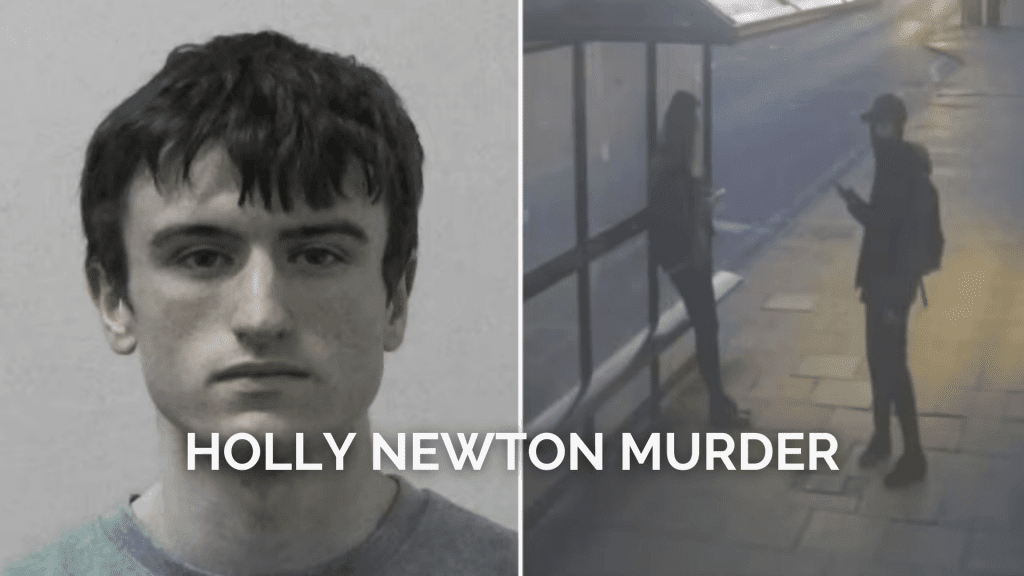The nation is grappling with shock and grief over the tragic story of Holly Newton, a 15-year-old from Northumberland whose life was cruelly taken by her ex-boyfriend, Logan MacPhail, in January 2023. Holly’s death has reignited conversations around teenage relationships, domestic violence, and the importance of recognizing red flags even in young relationships.
A Life Cut Short: The Incident in Hexham
On that fateful day, Holly Newton encountered her ex-boyfriend, 17-year-old Logan MacPhail, who attacked her with a knife in a secluded alleyway in Hexham, Northumberland. Reports reveal that she was stabbed 36 times in a frenzied attack that stemmed from Logan’s resentment and jealousy after the relationship ended. Tragically, her attempt to leave the relationship escalated into a horrific encounter, resulting in fatal injuries.
The Sentencing and Public Reaction
Recently sentenced to a minimum of 17 years, Logan MacPhail will serve his time in detention, with the severity of his sentence underscoring the brutal nature of the crime. He will be detained for life, and public sentiment reflects relief that justice is served, though this can never replace the loss of Holly. Holly’s mother, Micala Trussler, spoke out about the horror of watching CCTV footage of her daughter’s last moments, describing it as something from a “horror movie.”

Credit: Northumbria Police
In response to her daughter’s tragic end, Micala has voiced concerns about the legal classification of her daughter’s murder as a knife crime rather than a case of domestic abuse, stating that this overlooks the controlling behaviors often found in teenage relationships.
A Culture of Coercive Control and the Dangers of Teenage Domestic Violence
Holly’s case is especially heartbreaking because it reflects a wider, often underreported issue: coercive control in teenage relationships. The Independent reports that MacPhail’s jealousy and control ultimately led him to violence when Holly decided to end things. In a piece by The Guardian, experts have pointed out that Holly was too young to fully recognize the red flags associated with coercive control, and her experience resonates with many young people who may not see such signs in their own relationships.
This tragic event has drawn attention to the need for education around identifying and understanding coercive control in relationships at a young age, even as early as high school. Parents, educators, and community leaders are urged to engage in open conversations to help teenagers recognize unhealthy behaviors, fostering awareness that can prevent future tragedies.
The Seven Sinister Signs: How Logan MacPhail Gave Himself Away
Forensic experts have uncovered a chilling series of behaviors that pointed to MacPhail as the perpetrator. According to The Sun, he exhibited several disturbing traits that hinted at his potential for violence and his obsession with Holly. Among these signs was his tendency to use his full name during interactions, his immediate display of forced sympathy, and his continued attempts to maintain control even after Holly had ended their relationship. These signs, although subtle, are now being scrutinized in retrospect as clear indicators of his growing hostility.

Credit: Northumbria Police
Calls for Legislative Change
Holly’s case is not just a tragedy but a wake-up call. The BBC reports that Holly’s mother has called for legislative changes, urging lawmakers to redefine what constitutes domestic abuse, especially in the context of teenage relationships. Presently, crimes of this nature are often categorized as “knife crimes,” which fails to capture the nuances of domestic abuse among young individuals. Micala believes that reclassifying this crime as domestic abuse would better reflect the controlling and manipulative dynamics that led to Holly’s tragic end.
A Community in Mourning and the Path Forward
Hexham, Northumberland, remains deeply affected by Holly’s murder. The community has come together to mourn her passing and to support the family in their call for awareness and preventive measures. Schools and youth organizations in the region are stepping up to provide resources and workshops to educate young people about healthy relationships.
The outpouring of support from across the country has been immense. Holly’s story has touched the hearts of many, with people everywhere coming to terms with the fact that domestic violence is not limited to adults. Teenage relationships can carry similar risks, making it all the more crucial to address these issues at an early age.
The Importance of Recognizing Warning Signs in Relationships
One of the lasting messages from Holly’s story is the importance of identifying and addressing the signs of unhealthy relationships early on. Patterns of jealousy, possessiveness, and control are often downplayed or overlooked in teenage relationships, which can lead to dangerous situations. Awareness campaigns, such as those promoted by the NSPCC and Women’s Aid, emphasize that recognizing these behaviors can be lifesaving.
For parents, educators, and friends, it’s essential to look out for indicators of potential abuse. While teenagers are often new to relationships, guidance and support from those around them can help them better understand what is acceptable in a healthy relationship versus what is not.
A Call to Educate and Prevent
This tragic case highlights the need for a comprehensive approach to educating young people on the dynamics of healthy and unhealthy relationships. Many believe that such education could prevent future tragedies like Holly’s. Starting these conversations in schools can empower teenagers with the knowledge and resources needed to recognize red flags and seek help if necessary.
There are organizations and helplines dedicated to supporting young people in such situations, including the NSPCC’s Childline, which provides confidential support to young people who may feel trapped or fearful in their relationships.
In Holly’s Memory
As the family of Holly Newton works to come to terms with their loss, they are committed to bringing attention to the issue of teenage domestic violence. Holly’s mother, Micala, has become a passionate advocate for legislative change, and her voice has resonated with many across the UK who believe that Holly’s story must be a catalyst for change. Her memory serves as a stark reminder of the importance of raising awareness about the dangers of coercive control, particularly among teenagers who may be too young to recognize the signs of an abusive relationship.

Credit: Family handout
Helpful Resources and Links
- BBC News coverage on Holly Newton’s case
- Guardian: Holly Newton murder and calls for legal changes
- NSPCC Childline – Support for young people in need
- Women’s Aid – Resources on domestic abuse and support services
This heartbreaking story underscores the urgent need for greater awareness and education to protect young people from similar tragedies. By acknowledging and learning from Holly’s story, we can hope to prevent other young lives from being lost to violence.
About Us
- Akhil Boddu’s YouTube Channel – Follow my vlogs for personal experiences and tips.
- Code With Me YouTube Channel – Explore tech tutorials and coding advice.
- Weblog Trips LinkedIn – Connect with me on LinkedIn for more insights and discussions.
If the information you are looking for is not available here, please contact us. Additionally, follow us on our social media platforms for updates and more information.







